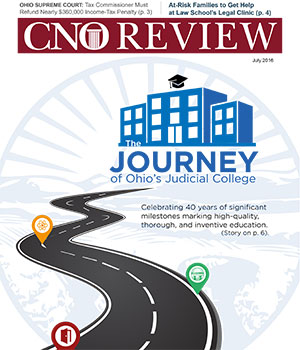Ohio Judicial College Celebrates 40 Years
Four decades ago, Ohio mandated education for its judges, and the Ohio Judicial College was born. This month marks the 40th anniversary.
When the Judicial College opened its doors in 1976, there were four courses offered that served about 475 judges. Fast-forward nearly 40 years later, and that number has grown to 222 courses, serving more than 21,000 judges, magistrates, court personnel, and the public.
“I think since we decided many decades ago that judges had to have continuing legal education, it was paramount that we identified and created an organization that was going to provide that education. It does absolutely no good to mandate education and not have that education be quality, and that quality education obviously is the hallmark of the Judicial College,” Ohio Supreme Court Chief Justice Maureen O’Connor said.

Click the image above to view the recent CNO Review cover story by Kathleen Maloney about the Judicial College's 40-year history.

Click the image above to view the recent CNO Review cover story by Kathleen Maloney about the Judicial College's 40-year history.
Ohio’s judges are required to have 40 hours of continuing legal education credit every two years. Of those, 10 hours must be through the Judicial College.
Christy Tull is the Judicial College’s fourth leader in as many decades. She said the Court looks at the educational need when identifying new courses and then recruits faculty in and outside of the Court to effectively teach the courses.
“We have a backbone of courses that we may repeat from year to year, but I would say every year the majority of our courses are developed fresh for whatever that particular need is educationally that year,” Tull said.
One example is when the Ohio Supreme Court issued new adult guardianship rules that went into effect last year. The Judicial College had to design and implement a six-hour course for guardians and will have to continue to create new courses each year for continuing education.
The Judicial College also prepares judges, who were recently elected or appointed to the bench, with a two-week new judge orientation program.
“The Judicial College is needed because the public mandates competent performance of its judiciary and education is a means to that end, and so we take very seriously the fact that, yes, we are providing this education to the judges, to the magistrates, to the court personnel, but we are really doing it for the public who walks into the courthouse every day,” Tull said.
Chief Justice O’Connor agrees and said citizens benefit when judges participate in specific trainings or take time to educate themselves about changes in the law.
“They’re educated because they take quality courses, and those quality courses are offered by the Judicial College. It helps them be better judges, and if we have better judges that the public interact with then it boosts the confidence level that people have in our judiciary and that’s extremely important,” Chief Justice O’Connor said.
Justice Judith Ann Lanzinger was a former Judicial College board member for seven years. She said Court staff designs courses to build confidence in both the judges and the public.
“It’s very important that the people who are doing the job of judge be substantively knowledgeable and also have the skills to take that knowledge and apply it,” Justice Lanzinger said. “Judges who are up on their skills are going to be better servants to the public, and that’s what we are. We have to be the best we can be, so it’s important to stay up on trends.”
Not all states require judges to take continuing legal education. Chief Justice O’Connor said because of this, Ohio is widely respected by other states across the country and recognized as having developed quality judicial education.


